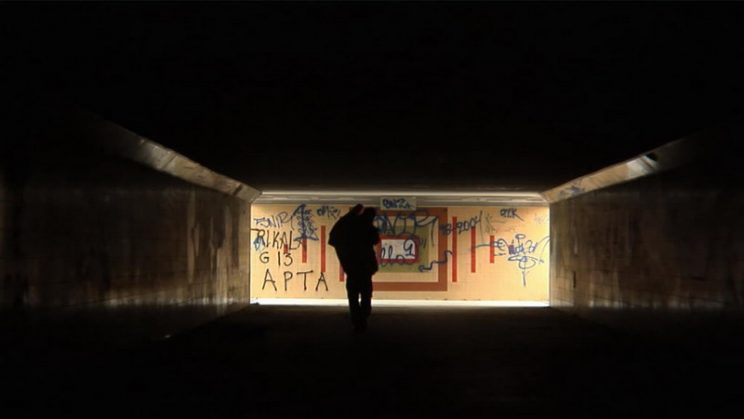Thanos Anastopoulos’s second feature is a riddle that keeps the spectator wandering till the very end. Fresh out of prison, a man in his late thirties starts stalking a young single mother all over Athens: film logic and experience would have us guess he is the husband/ father in this equation and now he wants back inside the family (or at least to be a part of the girl’s life). One of the merits of the film is that it manages to be both obscure and allusive at the same time – dropping hints and creating false tension points – and this commands the attention of the audience and the willingness to search every corner of the screen for clues. Correction is a very engaging film, although sometimes it does feel a bit to formal in it’s obstinacy not to reveal too much.
The film achieves this by the use of a realist non-fiction stylistic: the audience is refused even the smallest piece of information if it doesn’t come naturally from the flow of events. And the events flow in (almost) pure observational documentary fashion. Of course this is also fiction, there are countless moments that could have played out otherwise (a confrontation between the two, the mother going to the police, the child asking questions), but it is one in which the spectator enters benevolently. What matters in the end is what happens around this central question that traps the audience.
Firstly, there is the “documentary” quality of both image and meaning: the low-fi shaky camera tracks this outcast all over the sleaziest and poorest parts of town. The feeling is further enhanced by the heavy use of non-professional actors. On one occasion we witness a conversation he has with the woman in charge at a local shelter and everything there is “real” except him: the shelter is real and the woman works there, the conversation is dictated by the written procedures, the other people staying there are real people living in the shelter.
Secondly, and more importantly, what really hooks the audience are the two main characters: the ex-convict Yorgos (Yorgos Symeonidis) and the woman (Ornela Kapetani). The film starts out as his story, but towards the end we also begin to see things from her point of view. This switch is quite a big crack in the film’s declared aesthetics (the unreliable subjective POV of one person which explains the limited access to information) but what it looses in formal representation it gains in emotion. Searching the frame for clues slowly becomes searching the faces of the characters for clues. And while there is not much information there, there is certainly a lot of emotional intensity: guilt and remorse on the part of the man, hate and vindictiveness on the part of the woman. And it so happens that we get the emotional dynamics – that which really matters – before we find out the reason: the man does indeed want to be a husband and father, but this is because he accidentally killed the person he is now replacing. There is a ring of traditional/ tribal/ patriarchal thinking here that is not quite explained – the husband, an Albanian, was killed by a gang of Greek football hooligans – as Yorgos seems to be driven by some sort masculine sense of responsibility (which translates into the quasi happy-ending), but the outcome melts in a couple of tender moments that shows two strangers trying to pick up the broken pieces of their lives.

